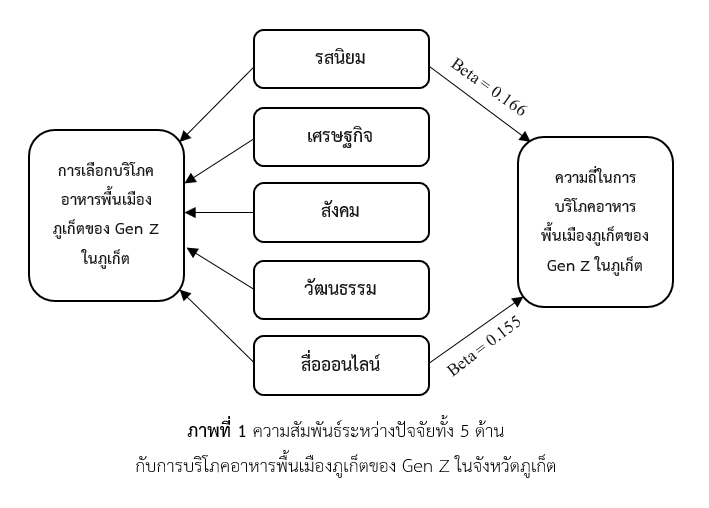Factors Influencing the Consumption of Phuket's Local Cuisine among Generation Z
Main Article Content
Abstract
This research aims to 1) study the behaviors and factors influencing the consumption of Phuket’s local cuisine among Generation Z in Phuket, 2) examine the relationship between various factors and the frequency of consumption, and 3) compare the factors affecting local cuisine choices among participants from different regions. The study employed quantitative research methods, collecting data from 402 questionnaires. The target population was Generation Z, individuals born between 1997 and 2012. The results indicate that: 1) most respondents consume Phuket’s local food approximately 2–3 times per week, usually with friends and family, often on special occasions such as gatherings or festivals. Moo Hong is the most popular savory dish, while the favorite dessert is O-Aew. Most respondents spend between 101–200 baht per meal. Regarding factors influencing local food consumption, cultural factors have the most significant impact (x̅= 4.41), followed by taste (x̅ = 4.35), online influence (x̅= 4.34), economic factors (x̅= 4.32), and social factors (x̅= 4.30). 2) Taste and online influence are positively correlated with consumption frequency. 3) The factors of taste, economics, culture, and online influence affect food choices among participants from different regions. These findings can serve as a guideline for promoting local food consumption tailored to Generation Z while supporting local economies and cultural tourism.
Article Details
References
กิตติยา เกิดปลั่ง และวรรษิดา บุญญาณเมธาพร. (2565). ตัวแบบปัจจัยการรับรู้คุณค่ากับประสบการณ์ทางเศรษฐกิจของนักท่องเที่ยวต่อเทศกาลอาหารท้องถิ่นในจังหวัดภูเก็ต. วารสารรัชต์ภาคย์, 16(45), 297–320.
ชิดชนก อนันตมงคลกุล และนิติพงษ์ ทนน้ำ. (2564). ปัจจัยที่มีผลต่อพฤติกรรมการบริโภคอาหารพื้นเมืองภูเก็ตของนักท่องเที่ยวในจังหวัดภูเก็ต. วารสารบริหารธุรกิจและการบัญชี มหาวิทยาลัยขอนแก่น, 5(1), 113–134.
ณนนท์ แดงสังวาลย์, ประสพชัย พสุนนท์ และเกตุวดี สมบูรณ์ทวี. (2565). การวิเคราะห์องค์ประกอบเชิงยืนยันภาพลักษณ์แหล่งท่องเที่ยวเชิงอาหารพื้นถิ่น จังหวัดภูเก็ต. วารสารสันติศึกษาปริทรรศน์ มจร, 10(5), 1983–1998.
ภาณุวัฒน์ ภักดีอักษร และปทุมมาลัย พัฒโร. (2564). การวิเคราะห์ปัจจัยองค์ประกอบเชิงสำรวจของแรงจูงใจนักท่องเที่ยวต่างชาติเพื่อการท่องเที่ยวเชิงอาหารในจังหวัดภูเก็ตประเทศไทย. วารสารมนุษยศาสตร์วิชาการ, 28(2), 1-27.
สำนักงานสถิติจังหวัดภูเก็ต. (2566, เมษายน 28). รายงานสถิติจังหวัดภูเก็ต: ประชากรหญิงและชาย 2566. https://phuket.nso.go.th/images/documents/Phuket%20Provincial%20Statistical%20Report/2566/7.female%20and%20male66.pdf.
สำนักงานสถิติจังหวัดภูเก็ต. (2567, พฤษภาคม 27). ประชากรแฝงจังหวัดภูเก็ต พ.ศ.2566. https://phuket.nso.go.th/index.php?option=com_content&view=article&id=921:ประชากรแฝงจังหวัดภูเก็ต-พ-ศ-2566&catid=36.
อมรศรี แซ่ตัน และชญาภัทร์ กี่อาริโย. (2566). การใช้บริการร้านอาหารพื้นถิ่นของผู้บริโภค จังหวัดภูเก็ต. วารสารพัฒนาเทคนิคศึกษา, 5(125), 99-109.
Chen, J., Xu, A., Tang, D., & Zheng, M. (2024). Divergence and convergence: A cross-generational study on local food consumption. Scientific Reports, 14(1), 13463.
Chaigasem, T., & Kumboon, A. (2024). The Influence of Cultural Heritage Values and Gastronomy Tourism on Cultural Identity in Phuket Old Town, Thailand. GeoJournal of Tourism and Geosites, 52(1), 41-48.
D’Andrea, A., & D’Ulizia, A. (2023). Preserving local food traditions: A hybrid participatory approach for stimulating transgenerational dialogue. Societies, 13(4), 95.
Dechakul, M., & Monpanthong, P. (2024). Decision Making on Participating in Phuket’s Gastronomic Tourism: Evidence from European Tourists. Rajapark Journal, 18(59), 523-538.
Hoang, D. P., Nguyen Hai, D., Nguyen, V. T. N., Nong, H. T., Pham, P. T., & Tran, T. M. (2024). Factors affecting restaurant choices for traditional foods among Gen Y and Gen Z: A multigenerational study on Vietnamese “Pho”. Journal of Hospitality and Tourism Insights, 7(2), 868-888.
Krejcie, R. V., & Morgan, D. W. (1970). Determining sample size for research activities. Educational and Psychological Measurement, 30(3), 607-610.
Kymäläinen, T., Seisto, A., & Malila, R. (2021). Generation Z food waste, diet, and consumption habits: A Finnish social design study with future consumers. Sustainability, 13(4), 2124.
Orea-Giner, A., & Fusté-Forné, F. (2023). The way we live, the way we travel: Generation Z and sustainable consumption in food tourism experiences. British Food Journal, 125(13), 330-351.
Pavelková, J., Turčínková, J., & Grajciar, A. (2023). Conspicuous food consumption of Gen Z and social media use. Review of Applied Socio-Economic Research, 26(2), 132-140.
Soonsan, N., Phakdee-auksorn, P., & Suksirisopon, P. (2023). Determining food attributes for measuring and evaluating a gastronomic destination's appeal to visitors. Journal of Hospitality and Tourism Insights, 6(5), 1755-1775.
Tănase, M. O., Nistoreanu, P., Dina, R., Georgescu, B., Nicula, V., & Mirea, C. N. (2023). Generation Z Romanian students’ relation with rural tourismAn exploratory study. Sustainability, 15(10), 8166.
Tjokrosaputro, M. (2023). Experiential value toward behavioral intention of local food through consumer attitude: Insight from Gen Z's in Jakarta. Jurnal Aplikasi Manajemen, 21(1), 179-190.
UNESCO. (n.d.). Phuket. UNESCO Creative Cities Network. https://www.unesco.org/en/creative-cities/Phuket.


